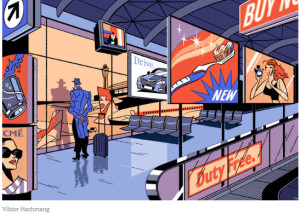 This is a great piece from the NYT.
This is a great piece from the NYT.
“Attention is a resource; a person has only so much of it. And yet we’ve auctioned off more and more of our public space to private commercial interests, with their constant demands on us to look at the products on display or simply absorb some bit of corporate messaging. Lately, our self-appointed disrupters have opened up a new frontier of capitalism, complete with its own frontier ethic: to boldly dig up and monetize every bit of private head space by appropriating our collective attention. In the process, we’ve sacrificed silence — the condition of not being addressed. And just as clean air makes it possible to breathe, silence makes it possible to think”.
How much more advertising do we need? Does anyone really pay attention to ads? I don’t. If I want to find out what’s good, I call my friends.
And doesn’t this invasion of advertising really track back to the dot-com days, when we unwittingly traded our privacy for some app or service we really didn’t need in the first place? All because the app or service was free?
Hasn’t all this led us into the surveillance state? Of course it has. The surveillance state relies on data. Where’s the data coming from? From free services such as Facebook and Google. Yo. When you post on Facebook guess who’s watching you?
I recently attended a tech gathering. A friend was there, he was chatting with a tech titan (tt) from Boulder. We started talking. tt was convinced that life has never been better and it’s all because of tech. His thesis was life is good for him, therefore life is good for everyone.
But he’s rich, living high off the hog in Boulder. Tech insiders are doing well, getting phat mostly off of apps the world really doesn’t need. Most of them are getting rich off of our data.
Is life really good for the rest?
It’s a gross generalization to say that tech is making the world better. In fact there’s plenty of evidence to suggest otherwise. Look. I love tech. But I’m not a homie. I’m critical of tech, too.
Apps that put companies against each other in a price war are great for consumption are the domain of the well off. But they don’t do the person in the ghetto any good, because they can’t afford consumption. And the people in California are now paying for years of consumption.
If tech companies are doing all they claim, why are all their employees blue bloods or insiders? Why aren’t tech companies hiring people of color, Iraq veterans, of those from the hood? Why aren’t tech companies opening offices in economically depressed neighborhoods?
Tech is driving the evaluation of a good or service to price, or a “like”, nothing else. A company could offer great benefits and salaries to its employees, be a great steward of the planet, provide outstanding service to its customers. But if the price they charge is higher, they can’t make a go of it. Why? Tech. Tech arms consumers with apps that don’t factor how great the company is – they drive the user to make the decision on price, nothing else.
There’s collateral damage here, people. Employees are paid less, benefits are cut. Why? Because it’s the only way a company can compete.
And it all started with free. The High Cost of Free.
What’s the solution? Young people in tech. They led us here, they can lead us out. In fact it’s their responsibility.
By opening up offices in depressed neighborhoods. By hiring people of color, Iraq vets, people convicted of victimless crimes, and the disadvantaged. By making apps the world really needs, nothing else. By starting businesses that are built to last — not built to flip. By abandoning and boycotting free, where the customer is the product being sold.
If tech companies really want to change the world, they should be investing in our poorest neighborhoods; funding businesses and economic development. Providing training and helping neighborhood citizens be part of the American Dream. Young people in tech should start realizing that “to whom much is given, much is expected”.
Leave a Reply